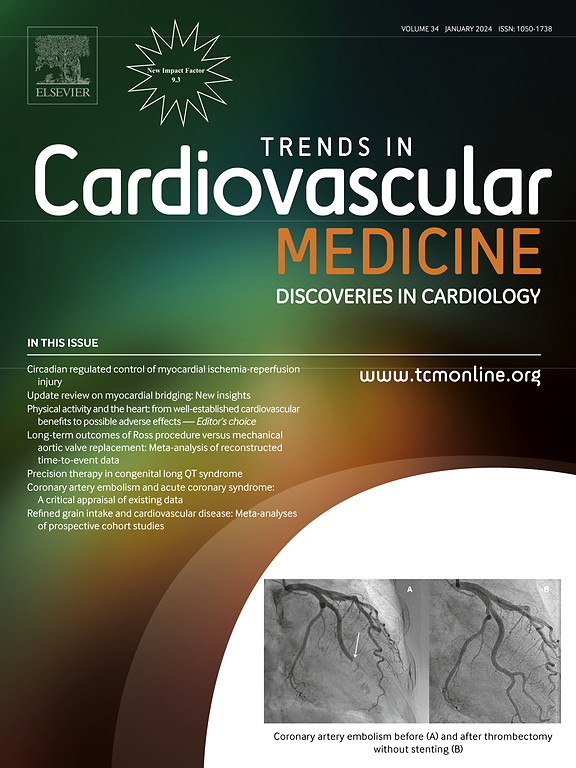人工智能驱动的心电图:肥厚型心肌病管理的创新。
IF 9
2区 医学
Q1 CARDIAC & CARDIOVASCULAR SYSTEMS
引用次数: 0
摘要
肥厚型心肌病(HCM)由于其表型和临床过程的异质性,给诊断和预后带来了复杂的挑战。人工智能(AI)和机器学习(ML)技术有望改变心电图(ECG)在 HCM 诊断、预后和管理中的作用。包括深度学习(DL)在内的人工智能使计算机能够从数据中学习模式,从而开发出能够分析心电信号的模型。卷积神经网络等深度学习模型在准确识别心电图中与 HCM 相关的异常方面已显示出良好的前景,超过了传统的诊断方法。在诊断 HCM 时,ML 模型在区分 HCM 和其他心脏疾病方面表现出很高的准确性,即使是在心电图结果正常的情况下也是如此。此外,人工智能模型还能预测导致心脏性猝死的心律失常事件,并识别有心房颤动和心力衰竭风险的患者,从而加强了风险评估。这些模型结合了临床和成像数据,可对患者的风险状况进行全面评估。挑战依然存在,包括需要更大、更多样化的数据集来提高模型的通用性,并解决罕见事件预测中固有的不平衡问题。尽管如此,人工智能驱动的方法仍有可能通过提供及时准确的诊断、预后和基于患者个体风险特征的个性化治疗策略,彻底改变 HCM 的管理。本综述探讨了当前人工智能在心电图分析中应用于 HCM 的情况,重点关注人工智能方法的进展及其在 HCM 治疗中的具体实施。本文章由计算机程序翻译,如有差异,请以英文原文为准。
Artificial intelligence-driven electrocardiography: Innovations in hypertrophic cardiomyopathy management
Hypertrophic Cardiomyopathy (HCM) presents a complex diagnostic and prognostic challenge due to its heterogeneous phenotype and clinical course. Artificial Intelligence (AI) and Machine Learning (ML) techniques hold promise in transforming the role of Electrocardiography (ECG) in HCM diagnosis, prognosis, and management.
AI, including Deep Learning (DL), enables computers to learn patterns from data, allowing for the development of models capable of analyzing ECG signals. DL models, such as convolutional neural networks, have shown promise in accurately identifying HCM-related abnormalities in ECGs, surpassing traditional diagnostic methods.
In diagnosing HCM, ML models have demonstrated high accuracy in distinguishing between HCM and other cardiac conditions, even in cases with normal ECG findings. Additionally, AI models have enhanced risk assessment by predicting arrhythmic events leading to sudden cardiac death and identifying patients at risk for atrial fibrillation and heart failure. These models incorporate clinical and imaging data, offering a comprehensive evaluation of patient risk profiles. Challenges remain, including the need for larger and more diverse datasets to improve model generalizability and address imbalances inherent in rare event prediction. Nevertheless, AI-driven approaches have the potential to revolutionize HCM management by providing timely and accurate diagnoses, prognoses, and personalized treatment strategies based on individual patient risk profiles.
This review explores the current landscape of AI applications in ECG analysis for HCM, focusing on advancements in AI methodologies and their specific implementation in HCM care.
求助全文
通过发布文献求助,成功后即可免费获取论文全文。
去求助
来源期刊

Trends in Cardiovascular Medicine
医学-心血管系统
CiteScore
18.70
自引率
2.20%
发文量
143
审稿时长
21 days
期刊介绍:
Trends in Cardiovascular Medicine delivers comprehensive, state-of-the-art reviews of scientific advancements in cardiovascular medicine, penned and scrutinized by internationally renowned experts. The articles provide authoritative insights into various topics, encompassing basic mechanisms, diagnosis, treatment, and prognosis of heart and blood vessel disorders, catering to clinicians and basic scientists alike. The journal covers a wide spectrum of cardiology, offering profound insights into aspects ranging from arrhythmias to vasculopathies.
 求助内容:
求助内容: 应助结果提醒方式:
应助结果提醒方式:


